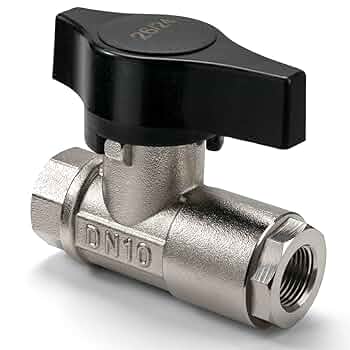For professional pressure washing contractors, efficiency and durability are critical. Equipment failures in the field can cost valuable time, money, and reputation. One small but essential component that often gets overlooked is the ball valve. In particular, the DN10 ball valve has become a go-to choice for contractors who want to upgrade their systems with a more robust, high-flow shut-off solution. Understanding what this valve is, how it works, and why it matters can give your operation a competitive edge.
What Is a DN10 Ball Valve?
A ball valve is a quarter-turn shut-off device used to control the flow of water through a pressure washing system. “DN10” refers to the nominal diameter of the valve—10 millimeters—allowing for a generous flow rate while still maintaining compact size. Unlike cheaper fittings that can seize up under heavy use, a DN10 ball valve is designed for repeated opening and closing at high pressures, making it ideal for demanding commercial environments.
Key Features Contractors Value
Commercial pressure washing contractors deal with high PSI and frequent on/off cycles. Standard hardware store valves can quickly fail under these conditions. A high-quality DN10 ball valve typically features:
- High Pressure Ratings: Many models are rated for 4,000 PSI or higher.
- Corrosion-Resistant Materials: Stainless steel or brass bodies and PTFE seals handle hot water and chemicals.
- Full-Flow Design: The bore size allows maximum water flow without restriction, preventing pressure drop.
- Easy Operation: Quarter-turn handles allow for fast shut-off even with gloves on.
These features translate into reduced downtime, longer service life, and safer operation for your crew.
Why It Matters in a Pressure Washing System
When cleaning large surfaces, operators often need to stop water flow quickly—either to switch tools, move hoses, or pause work for safety reasons. Without a reliable ball valve, contractors risk leaks, pressure spikes, or complete system shutdowns. Installing a DN10 ball valve at the gun or hose end makes switching between nozzles, wands, and surface cleaners seamless. The result: faster job completion and happier clients.
Compatibility with Surface Cleaners and Accessories
Many advanced surface cleaners and pressure washing accessories are designed with DN10 fittings in mind. By standardizing on DN10 ball valves, contractors simplify their setups and ensure compatibility across multiple hoses, guns, and attachments. This can dramatically reduce the inventory of spare parts and adapters you need to carry to each job site.
Maintenance Best Practices
Like any component in a high-pressure system, ball valves benefit from routine inspection and maintenance. After each job:
- Flush the valve with clean water to remove debris and chemicals.
- Check for leaks at the seals and fittings.
- Lubricate moving parts if recommended by the manufacturer.
- Replace worn seals promptly to maintain pressure integrity.
Following these steps will extend the service life of your DN10 ball valve and minimize costly downtime.
Upgrading Your System for Performance
If your current setup uses smaller or lower-rated valves, upgrading to a DN10 ball valve can be a simple yet impactful improvement. Contractors report smoother operation, less pressure drop, and fewer failures when switching to high-quality DN10 valves. Combined with properly rated hoses, guns, and surface cleaners, it’s a small investment that pays big dividends in efficiency and reliability.
Whether you’re outfitting a new rig or retrofitting an existing one, choosing the right components ensures that your crew can focus on cleaning rather than troubleshooting. The DN10 ball valve is one of those unsung heroes of the system—quietly doing its job but essential to the smooth operation of every project.
Ready to equip your team with dependable, commercial-grade components? Explore Hi-Low Solutions for premium pressure washing equipment, including valves, hoses, guns, and advanced surface cleaners designed to keep contractors working smarter and faster.



